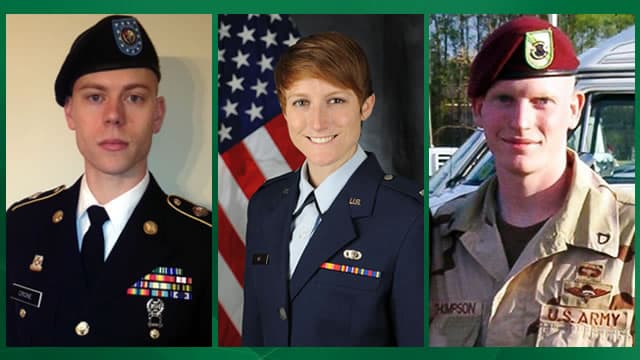
In 2014, Tyler Crone spent nine months in Bagram, Afghanistan, overseeing computer hardware networks and software systems handling highly sensitive data during Operation Enduring Freedom. A few months ago, Magin Day was in the flight operations center of Ramstein Air Base, Germany, leading 18 highly skilled service members in target development for Europe and Africa. A few years ago, Frank Thompson deployed to Iraq as a parachute rigger in support of Special Forces units and later spent time in Afghanistan, too.
This fall, Crone, Day and Thompson will converge on UNC Charlotte’s campus to begin graduate studies, through financial support earmarked for military veterans. This special University funding, called a graduate assistantship, requires recipients to serve a number of hours each week working under the guidance of a faculty member on research projects or teaching duties.
UNC Charlotte’s Graduate School awards three graduate assistantships to military veterans who have been accepted into master’s degree or doctoral programs. The annual two-year awards cover tuition and health insurance and provide a monthly stipend. They are valued at $36,000 for master’s degree candidates and $45,000 for doctoral candidates. Crone, Day and Thompson were selected in a competitive process from among veterans accepted into UNC Charlotte graduate programs for fall 2016. The Graduate School awarded its first assistantships to military veterans last fall.
Tom Reynolds, dean of the Graduate School and a U.S. Navy veteran of the Vietnam War, stated the program is proving successful and fulfilling its aims.
“These veterans served and sacrificed,” Reynolds said. “We’re recognizing their contributions by supporting their higher education goals. But we have a selfish motive, too. We want to attract these exceptional men and women to Charlotte with the hope that they will remain here. The skills they acquired in the military, coupled with outstanding graduate education, make them exceptionally valuable to our community.”
Reynolds noted the University began as the Charlotte Center in 1946 to meet the higher education needs of returning World War II veterans. “We’re carrying on that worthy tradition,” Reynolds said.
Crone served six years in the Army Reserves in financial management. His responsibilities in Afghanistan involved extensive travel, and he was posted to six different operation bases in country. After returning from overseas, Crone taught high school computer science for several years. Now, he will pursue a master’s degree in mathematical finance with the aim of working in the finance industry as a quantitative analyst.
Like other veterans, Crone credits his military experience with instilling persistence and dedication. He said, “I know what it means to sacrifice for the greater good of an organization.” Crone said the Graduate School funding will allow him to make the transition from his teaching position to advanced learning. “This assistantship will allow me to continue helping others while improving my own abilities by attending University full time,” he said.
Day, in addition to serving as an intelligence officer, is an Olympic-level athlete. She represented the Air Force as a long-distance runner in military and civilian competitions throughout the United States and Europe. She will pursue a doctoral degree in health psychology. Day credits her military experience for teaching her perseverance, dedication, flexibility and patience. She said her Air Force responsibilities permitted her to experience and observe the mental and physical strain that accompanies 12-hour shifts and sleep deprivation in the military’s high-stress, high-speed environment. She saw how airmen struggled when they returned from deployment.
As a graduate student, Day wants to study the cognitive, emotional and social factors associated with adjusting to stressful life events – and not only for service members. She found the staff and faculty at UNC Charlotte to be “approachable, supportive and willing to go above and beyond” to support her during the competitive application process. Day said the Veteran Graduate Assistantship illustrates the University’s commitment to military-affiliated students. “Additionally, earning the award means I will have the opportunity to focus 100 percent of my time and energy to research and graduate studies,” Day noted.
Thompson served 12 years in the Army Reserve, first as a parachute rigger and later as a broadcaster specializing in video production. He is joined in Charlotte by his wife and two sons, and he credits the funding support from UNC Charlotte’s Graduate School with making his pursuit of an advanced degree possible. Thompson will be earning a master’s degree in counseling with a concentration in clinical mental health.
“My hope is to use my degree to help other veterans and their families adjust and achieve greatness in their civilian lives,” Thompson said. He cited motivation and dedication as qualities he acquired and honed in the military. “I’ve always believed in ‘mission first,’ and now the mission is bettering myself,” Thompson said. “Nothing will deter me from that.” He cautioned, though, that this transition will be challenging. “I have not seen the inside of a classroom in over a decade, so I will have to adjust from work mode to study mode.”
Roughly 200,000 military members are separating from service each year. A recent report by the Institute for Veterans and Military Families (“Work after Service: Developing Workforce Readiness and Veteran Talent for the Future") cited the valuable skills veterans bring to the workplace, such as leading teams, supervising, developing subordinates, planning, professionalism and problem solving.
UNC Charlotte works closely with regional military installations and veteran organizations such as USO North Carolina and Charlotte Bridge Home to take a holistic view toward outreach to and support for veterans, especially veterans in transition from service to the civilian sector. Although UNC Charlotte can address veterans’ higher education needs, partner agencies help support veterans in areas such as housing, spouse employment, job skill training, medical needs and recreation. The collective aim is to make Charlotte a welcoming and supportive community for veterans.